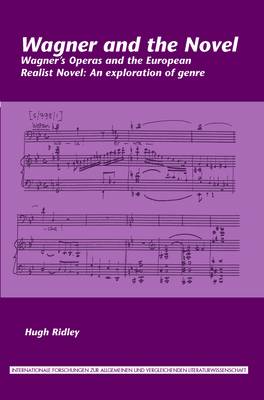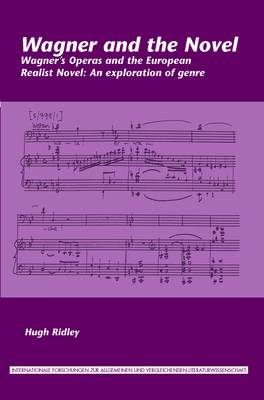
- Afhalen na 1 uur in een winkel met voorraad
- Gratis thuislevering in België vanaf € 30
- Ruim aanbod met 7 miljoen producten
- Afhalen na 1 uur in een winkel met voorraad
- Gratis thuislevering in België vanaf € 30
- Ruim aanbod met 7 miljoen producten
Zoeken
Wagner and the Novel
Wagner's Operas and the European Realist Novel: An exploration of genre
Hugh Ridley
€ 123,95
+ 123 punten
Omschrijving
This study bridges literature and music at an exciting and controversial point, offering the lover of music and literature and the specialist reader an insight into the relationship between Wagner's operas and the nineteenth century novel, including comparisons with Rigoletto and Der Rosenkavalier in their evolution from other forms. It discusses matters of genre and national tradition, placing Wagner's works in the heritage of the European Enlightenment.
Comparisons of Wagner's works with the novel have been fleeting, denoting only their length and complexity. Examining in principle and in detail the proximity of Wagner's themes and techniques to the practices of the Realist novel, this study sheds original light on major issues of Wagner's works and on opera as genre.
The book trawls extensively in two research fields. It looks to the established Wagner literature for understandings of the musical procedures which map his works onto the prose fiction, while reading Wagner's operas against the backdrop of the European novel, rather than against German Romantic fiction. It revisits Adorno's music sociology and his seminal study of Wagner, but repositions many elements of his argument. Unusually, this book adopts a critical stance to Nietzsche's view of Wagner. In marked contrast to Nietzsche, the study regards parallels between Wagner and Flaubert as an enrichment of our understanding of Wagner's achievement.
The book concludes with a major question of European cultural history: why it is that - in common with Italy, but in marked contrast to France or England - Germany's most representative works in the nineteenth century are operas rather than novels.
Comparisons of Wagner's works with the novel have been fleeting, denoting only their length and complexity. Examining in principle and in detail the proximity of Wagner's themes and techniques to the practices of the Realist novel, this study sheds original light on major issues of Wagner's works and on opera as genre.
The book trawls extensively in two research fields. It looks to the established Wagner literature for understandings of the musical procedures which map his works onto the prose fiction, while reading Wagner's operas against the backdrop of the European novel, rather than against German Romantic fiction. It revisits Adorno's music sociology and his seminal study of Wagner, but repositions many elements of his argument. Unusually, this book adopts a critical stance to Nietzsche's view of Wagner. In marked contrast to Nietzsche, the study regards parallels between Wagner and Flaubert as an enrichment of our understanding of Wagner's achievement.
The book concludes with a major question of European cultural history: why it is that - in common with Italy, but in marked contrast to France or England - Germany's most representative works in the nineteenth century are operas rather than novels.
Specificaties
Betrokkenen
- Auteur(s):
- Uitgeverij:
Inhoud
- Aantal bladzijden:
- 236
- Taal:
- Engels
- Reeks:
- Reeksnummer:
- nr. 156
Eigenschappen
- Productcode (EAN):
- 9789042035218
- Verschijningsdatum:
- 1/01/2012
- Uitvoering:
- Paperback
- Formaat:
- Trade paperback (VS)
- Afmetingen:
- 155 mm x 234 mm
- Gewicht:
- 331 g

Alleen bij Standaard Boekhandel
+ 123 punten op je klantenkaart van Standaard Boekhandel
Beoordelingen
We publiceren alleen reviews die voldoen aan de voorwaarden voor reviews. Bekijk onze voorwaarden voor reviews.








